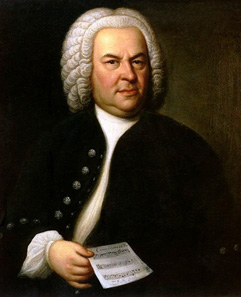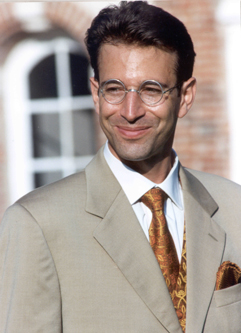|
|
|
Under the auspices of the Mayor of Prague 1 Oldřich Lomecký

Vážení milovníci krásné hudby a hudebních nástrojů,
je mi ctí, že jsem mohl převzít záštitu nad Festivalem Brikcius
2013, jenž je holdem vynikajícím skladatelům a violoncellistům i
violoncellu samotnému - nástroji, který více než jiné dokáže vyjádřit
pocity skladatele i samotného interpreta a jehož vztah s nimi bohatě
překračuje partnerství hudebníka a "pouhého" cella. Výstižně to
vyjádřil Mischa Maisky: Moje cello, to byla láska na první pohled,
první zvuk i první dotek. Nikdy se s ním nerozloučím.

Ing. Oldřich Lomecký The Mayor of Prague 1

#BACH330

Johan Sebastian Bach
(*21. 3. 1685 - †28. 7. 1750)
German baroque composer and organist Johann Sebastian Bach was born on
21 March 1685 in Eisenach, into the musical family. He was the
youngest child of Johann Ambrosius Bach (1645 - 1695), the director of
the town musicians, and Maria Elisabeth Lämmerhirt (1644 - 1694). Since
early childhood his father taught him to play violin and harpsichord.
When his mother and father died, the 10 year old orphan was raised by
his older brother, Johann Christoph Bach (1671 - 1721), the organist at
St. Michael's Church in Ohrdruf.
At the age of 14, Bach was awarded a choral scholarship to study
at the prestigious St. Michael's School in Lüneburg. In January 1703,
shortly after the graduation from St. Michael's Bach gained an
appointment as a court musician in the chapel of Duke Johann Ernst
(1662 - 1728) in Weimar. During his seven-month tenure at Weimar, his
reputation as a keyboard player spread. In August 1703, he accepted the
post of organist at St. Boniface's Church (later Neue Kirche, since
1935 Bachkirche) in Arnstadt. In 1705 he took three month vacation,
travelled on foot 400 kilometres to Lübeck to visit organist and
composer Dietrich Buxtehude (1637 - 1707). Without authorization from
Arnstadt, he stayed with Buxtehude for three months. Bach wanted to
become Buxtehude's assistant, but he did not wish to marry his
daughter, which apparently was a condition for his appointment. So he
returned back, again on foot.
In 1707 he took up a post as organist at St. Blasius's in
Mühlhausen. It included significantly higher remuneration and improved
conditions, as well as a better choir. Four months after arriving at
Mühlhausen, Bach married his second cousin, Maria Barbara Bach (1684 -
1720). Together they had seven children: Catharina Dorothea Bach (1708
- 1774), Wilhelm Friedemann Bach (1710 - 1784), twins Johann Christoph
Bach and Maria Sophia (1713 - 1713), Carl Philipp Emanuel Bach (1714 -
1788), Johann Gottfried Bernhard Bach (1715 - 1739) and Leopold
Augustus Bach (1718 - 1719).
In 1708 Bach left Mühlhausen, returning to Weimar this time as
organist and concertmaster at the court of the Duke Johann Ernst
(1662 - 1728). Bach moved his family into an apartment just five
minutes walk from the ducal palace. In the following year, their first
child was born and they were joined by Maria Barbara's elder,
unmarried sister Barbara Katharina Bach, who remained with
them to assist in the running of the household until her death in 1729.
Bach worked in Weimar till 1717, when he accepted post in Köthen
without dukes authorization. He spent few weeks in prison and he was
dismissed both from the prison and dukes services.
In 1717 Leopold, Prince of Anhalt-Köthen (1694 - 1728) hired
Bach to serve as his Kapellmeister. On 7 July 1720, while Bach was
abroad with Prince Leopold, Bach's wife Maria Barbara, the mother of
his first seven children, suddenly died. Most likely Bach composed
during the period 1717 - 1723 in Köthen the Six Suites for Cello Solo.
On 3 December 1721 the widower married Anna Magdalena Wilcke
(1701 - 1760), a young soprano, who performed at the court in Köthen.
Together they had 13 children: Christiana Sophia Henrietta Bach (1723 -
1726), Gottfried Heinrich Bach (1724 - 1763), Christian Gottlieb Bach
(1725 - 1728), Elisabeth Juliane Friederica Bach (1726 - 1781),
Ernestus Andreas Bach (1727 - 1727), Regina Johanna Bach (1728 - 1733),
Christiana Benedicta Bach (1730 - 1730), Christiana Dorothea Bach (1731
- 1732), Johann Christoph Friedrich Bach (1732 - 1795), Johann August
Abraham Bach (1733 - 1733), Johann Christian Bach (1735 - 1782),
Johanna Carolina Bach (1737 - 1781) and Regina Susanna Bach (1742 -
1809).
In 1723, Bach was appointed Cantor of the Thomas School at St.
Thomas Church in Leipzig and Director of Music in various churches in
Leipzig. In 1747, Bach visited the King of Prussia Frederick II. (1712
- 1786). The Art of Fugue was written shortly before Bach's death and
was finished but for the final fugue. Bach's health declined in 1749;
Bach became increasingly blind, and the British eye surgeon John Taylor
(1703 - 1772) operated on Bach while visiting Leipzig in 1750.
Johann Sebastian Bach died on 28 July 1750.
He was originally buried at Old St. John's Cemetery in Leipzig.
His grave went unmarked for nearly 150 years. In 1894 his coffin was
finally discovered and reburied in a vault within St. John's Church.
This building was destroyed by Allied bombing during World War II, and
in 1950 Bach's remains were taken to their present resting place at
Leipzig's Church of St. Thomas.
In Germany, many streets were named and statues were erected in
honour of Bach during the twentieth century. Three pieces of Bach's
work were, as part of the Voyager Golden Record, included on board the Voyager spacecraft. The Bach Crater on Mercury is named after him. In
1950 Wolfgang Schmieder (1901 - 1990) compiled thematically organised
catalogue of Bach's work, called Bach Werke Verzeichnis (BWV).
The Festival Brikcius commemorates the 330th anniversary of the
birth of Johann Sebastian Bach. For more about Johann Sebastian Bach
visit http://www.Brikcius.com and http://En.Wikipedia.org/Wiki/Johann_Sebastian_Bach
.

Top
Daniel Pearl World Music Days

Daniel Pearl
(*10. 10. 1963 - †21. 02. 2002)
The
world has come to know Daniel Pearl as the Wall Street Journal reporter
who was kidnapped and murdered by terrorists in Pakistan in early 2002,
just four months after 9/11. People around the world, along with his
pregnant wife and family, prayed for his release. Since then, he has
been remembered as a symbol of hope: a man who built bridges between
diverse cultures as a writer and a gifted musician.
Danny was born on October 10, 1963, in Princeton, New Jersey,
and grew up in Los Angeles, where he displayed an insatiable curiosity
for music, academics and sports. A gifted writer from a very young age,
Danny's aptitude for journalism became apparent as a student at
Stanford University where he co-founded the student newspaper Stanford
Commentary. He graduated in 1985 with Phi Beta Kappa honors and then
spent a summer as a Pulliam Fellow intern at the Indianapolis Star
before joining the North Adams Transcript and the Berkshire Eagle.
After a few years, he moved on to the San Francisco Business Times and
within few weeks he joined the Wall Street Journal in 1990. Danny
started in the Journal's Atlanta bureau and moved successively to the
Washington and London bureaus, serving as a Middle East correspondent.
After he met Mariane in 1998, he moved to Paris where they were married
a year later.
In October of 2000, they moved to Bombay, where Danny became the
South Asia Bureau Chief for the Wall Street Journal. Danny's skill as a
foreign correspondent was apparent not only in his entertaining Page
One "A-hed" pieces which shed light on other cultures, but also in
investigative stories that uncovered the truth from the rubble of war
and devastation. It was Danny who uncovered that the U.S. had
mistakenly bombed a Sudanese pharmaceutical plant, believing it to be a
weapons factory. Later, he broke the story of Al Qaeda's money
laundering through the Tanzanite gem market. It was from Bombay that
Danny covered the "war on terrorism," occasionally venturing into
Pakistan. He was retracing the steps of "shoe bomber" Richard Reid and
hoped to meet with Sheik Gilani, a spiritual leader, when he was
abducted in Karachi on January 23, 2002. For weeks, millions around the
world -- from heads of state, to religious leaders and ordinary people
-- rallied for Danny's release. In Danny, the terrorists believed they
abducted a media figure, an American, and a Jew. But they had much more
-- a true citizen of the world and an embodiment of civilized values,
whose death, like his life, would inspire millions of people in the
cause of decency and cultural understanding. Several weeks elapsed
without word of his fate; his murder was confirmed on February 21,
2002. Four of the kidnappers were convicted on July 15, 2002, including
mastermind Omar Saeed Sheik, although others believed to be involved
are still at large.
Two days before his abduction, Danny learned that his wife
Mariane was expecting a baby boy; he chose the name Adam for their son.
In May, just three months after his murder, Mariane Pearl gave birth to
Adam. Following his murder, Danny's family and friends established the
Daniel Pearl Foundation to carry on his legacy, using music and words
to address the root causes of the hatred that took his life. Like
previous such projects (e.g. eSACHERe",
" MAKANNA",
" Duo Brikcius -
2 Cellos Tour", " Weinberger
Tour", " Festival Brikcius", ...), "Festival Brikcius" forms part of the Daniel Pearl World Music
Days,
which commemorate the legacy of Jewish journalist, musician Daniel
Pearl, brutally murdered by group of terrorists for defending freedom
of speech. For more details visit websites http://www.Brikcius.com
, http://www.DanielPearlMusicDays.org
a http://En.Wikipedia.org/Wiki/Daniel_Pearl
.

Festivalový tip: Previous
FESTIVAL BRIKCIUS 2014 - the 3rd chamber music concert series at the
Stone Bell House (Autumn 2014) commemorated the Year of Czech Music
2014, the 55th anniversary of the death of Bohuslav Martinů, the 70th
anniversary of the death of Zikmund Schul, the 95th anniversary of the
birth of Gideon Klein, the 110th anniversary of the death of Antonín
Dvořák, the 110th anniversary of the birth of Iša Krejčí, the 120th
anniversary of the birth of Erwin Schulhoff, the 140th anniversary of
the birth of Josef Suk, the 160th anniversary of the birth of Leoš
Janáček and the Daniel
Pearl World Music Days.
|
|
|






